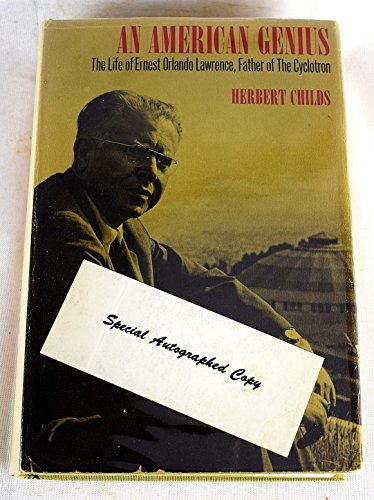Synopsis
He might have been just another bright youngster, growing up happy in a small Dakota town. But Ernest O. Lawrence turned out to be a genius. His engrossing life story, told here for the first time, is a major contribution to the history of modern science.
Ernest Orlando Lawrence was born and raised in a small prairie town in South Dakota. he was the grandson of immigrants, educated in county schools. But his accomplishments are second to none in American science. He was the physicist who created the word's first cyclotron, a Nobel Prize-winner while still in his thirties, a leader in developing the first atomic bomb, a pioneer in the development of radioisotopes for medical and industrial uses. He made his Radiation Laboratory at Berkeley a Mecca for physicists from every continent at a time when most American scientists looked to Europe for inspiration. When he died, at the age of fifty-seven, in 1958, President Dwight D. Eisenhower said that, in a real sense, Lawrence had given his life for his country.
Today, on a hill above the site of his famous "Rad Lab" at the University of California at Berkeley, the new Lawrence Hall of Science, devoted to developing improved methods of science education, stands as a fitting memorial to Ernest O. Lawrence.
Herbert Childs's authoritative biography of "E.O.L." is the result of many years of research. It covers the whole span of the great physicist's career — his background and boyhood, his study at South Dakota, Minnesota, Chicago and Yale, his appointment to the faculty of the University of California at Berkeley (the youngest full professor in the university's history), his invention and development of the cyclotron and other accelerators for the smashing of atoms—a major breakthrough in the study of the nature of matter. From great achievements as founder and director of Berkeley's world-famous Radiation Laboratory, he was called to challenging wartime service as one of the key men of the super-secret Manhattan Project. The book tells of Lawrence's association with Robert Oppenheimer, Enrico Fermi, Niels Bohr, and many other great men of science. Most significant of all, perhaps, it highlights Lawrence's lasting influence as the mentor and inspiration of a whole new generation of scientists—many of whom aretoday's leading nuclear scientists in government, research, and industry.
For those who would assume that America's scientific "brain-power" was largely imported from Europe, this life story will prove instructive and inspiring. Ernest Lawrence was an American genius, wholly American in every sense. Not an ivory-tower scientist, he was a man of enormous drive, optimism, and practical vision. His biography is a fascinating chapter in the history of science and a book to challenge the imagination of every science-minded reader.
"About this title" may belong to another edition of this title.
